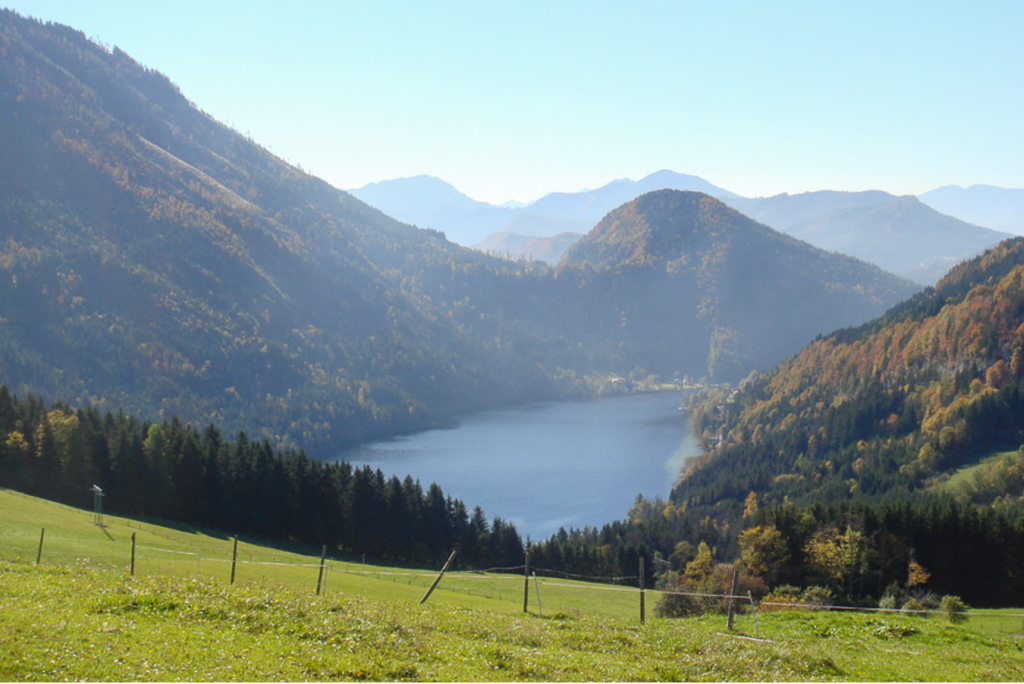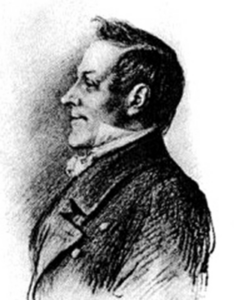Farewell, a reworking of a pilgrimage song
(Poet's title: Abschied, nach einer Wallfahrstarie bearbeitet)
Set by Schubert:
D 475
[September 1816]
Über die Berge
Zieht ihr fort,
Kommt an manchen
Grünen Ort,
Muss zurücke
Ganz allein.
Lebet wohl,
Es muss so sein!
Scheiden,
Meiden,
Was man liebt,
Ach wie wird
Das Herz betrübt!
O Seenspiegel,
Wald und Hügel
Schwinden all,
Hör’ verschwimmen
Eurer Stimmen
Widerhall.
Lebt wohl!
Klingt klagevoll.
Ach wie wird
Das Herz betrübt!
Scheiden,
Meiden,
Was man liebt.
Over the mountains
You are setting off;
You will come to many
Green places,
[I] have to go back
Completely alone;
Farewell!
This is how it has to be.
Parting
Avoiding
What one loves,
Oh how
Distressed the heart is becoming!
Oh, the lake-mirror,
Forest and hills,
They are all disappearing;
[I] can hear the decay
Of your voices’
Echo.
Fare well!
Ring out full of lamenting.
Oh how
Distressed the heart is becoming!
Parting,
Avoiding
What one loves.
All translations into English that appear on this website, unless otherwise stated, are by Malcolm Wren. You are free to use them on condition that you acknowledge Malcolm Wren as the translator and schubertsong.uk as the source. Unless otherwise stated, the comments and essays that appear after the texts and translations are by Malcolm Wren and are © Copyright.
☙
Themes and images in this text:
Being solitary, alone and lonely Echo Farewell and leave taking Green Hearts Hills and mountains Journeys Lakes Laments, elegies and mourning Mirrors and reflections Pilgrims and pilgrimage Woods – large woods and forests (Wald)
When Mayrhofer’s collected poems were published in 1824 this text was given the title Lunz, the name of a village in Lower Austria, south west of Vienna. This means that the lake-mirror must be the Lunzer See, which is indeed surrounded by hills and forest. We have to assume that there is therefore an autobiographical element to the text. Mayrhofer must have accompanied some friends out of Vienna and on reaching the foothills of the Alps at Lunz he himself had to return home as his companions headed off across the hills (Über die Berge).
The parting precipitates an intense feeling of loneliness and emptiness in the poet. He sees his friends (the ‘you’ being addressed is a plural form, ihr) going forwards together, while he has to return alone. The different trajectories seem to symbolise the psychological and spiritual differences between them. The friends, in company, are due to make progress; they will be able to encounter new (green) things. I, meanwhile, am alone and in retreat. The landscape I am revisiting is barren. My sensations go dim.
No, that is not quite right. There is no ‘I’ or ‘me’ in the text at all. The pronouns are elided: Muß zurücke / Ganz allein (Have to go back / Completely alone); Hör’ verschwimmen / Eurer Stimmen / Wiederhall (Can hear the decay / Of your voices’ / Echo). It is not ‘my’ heart but ‘the heart’ that is becoming distressed. Everything is impersonal and passive. The parting is not from people that ‘I love’ but from people and things that ‘are loved’ (was man liebt). You are real in your continued activity and your forward movement. Here, on this side, the return journey involves a retreat that involves a dissolution of the self.
The reflections in the lake, the echo of friends’ voices, they all fade. All that is left is an impersonal, empty lamenting heart. The song is a farewell to more than a couple of friends going for a walk in the hills.

http://www.moaserhof.at/wp-content/uploads/2015/05/moaserhof-lunz_am_see-013.jpg

https://api.hejfish.com/image/org/c8/9d/c89dd367072a746a1088a9a509d2909f51ec4b9a.jpeg
☙
Original Spelling and notes on the text Note: Schubert received Mayrhofer's texts generally in handwriting; the printed edition of Mayrhofer's poems appeared much later and usually presents the texts in a revised version. This version does not appear to exist in published form apart from Schubert's song. As set by Schubert: Abschied, nach einer Wallfahrstarie bearbeitet Über die Berge Zieht ihr fort; Kommt an manchen Grünen Ort, Muß zurücke Ganz allein; Lebet wohl! Es muß so seyn. Scheiden, Meiden, Was man liebt, Ach wie wird Das Herz betrübt! O Seenspiegel, Wald und Hügel, Schwinden all'; Hör' verschwimmen Eurer Stimmen Wiederhall. Lebt wohl! Klingt klagevoll. Ach wie wird Das Herz betrübt! Scheiden, Meiden, Was man liebt. Published version: Lunz Über die Berge Zieht ihr fort; Kommt an manchen Grünen Ort, Muß zurücke Ganz allein; Lebet wohl! Es muß so seyn. Scheiden, Meiden, Was man liebt, O wie wird Das Herz betrübt! Wald und Hügel, Seenspiegel - Schwinden all'; Hör' verschwimmen Eurer Stimmen Wiederhall. Scheiden, Meiden, Was man liebt, O wie wird Das Herz betrübt!
Confirmed by Peter Rastl with Gedichte von Johann Mayrhofer. Wien. Bey Friedrich Volke. 1824, pages 15-16.
To see an early edition of the text, go to page 15 [29 von 212] here: http://digital.onb.ac.at/OnbViewer/viewer.faces?doc=ABO_%2BZ177450902


